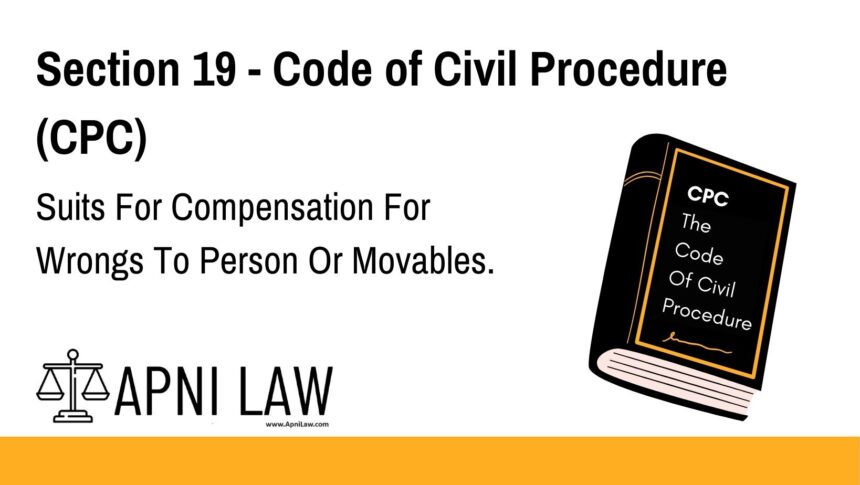Code
Where a suit is for compensation for
wrong done to the person or to movable property, if the wrong was done within the local limits of the
jurisdiction of one Court and the defendant resides, or carries on business, or personally works for gain, within
the local limits of the jurisdiction of another Court, the suit may be instituted at the option of the plaintiff in
either of the said Courts.Illustrations(a) A, residing in Delhi, beats B in Calcutta. B may sue A either in Calcutta or in Delhi.(b) A, residing in Delhi, publishes in Calcutta statements defamatory of B. B may sue A either in Calcutta or in
Delhi.
Explanation of Section 19 CPC
Section 19 of the Civil Procedure Code provides guidance on jurisdiction in civil cases involving personal injury or damage to movable property. It gives the plaintiff flexibility by allowing them to choose between two courts. One is where the wrongful act happened. The other is where the defendant lives, works, or does business.
This rule helps victims by reducing their burden of traveling to distant courts. It also promotes faster access to justice.
Unlike Section 20, which applies to general suits, Section 19 is specific to tort-related cases. These include physical harm, theft of belongings, and damage to movable items.
Highlights
- The plaintiff has two jurisdiction options.
- It applies only to wrongs against persons or movables.
- The section improves legal accessibility and convenience.
Illustrations
Example 1:
A, who lives in Delhi, hits B in Kolkata.
B can sue A either in Kolkata (where the act happened) or in Delhi (where A lives).
Example 2:
A lives in Delhi and prints a defamatory article about B, which is circulated in Mumbai.
B may sue in either Delhi or Mumbai.
Common Questions Asked
Q1. What kind of cases come under Section 19 CPC?
A. It covers civil suits for compensation related to personal injury or damage to movable property.
Q2. Can a plaintiff choose any court?
A. No. The choice is limited to either where the wrong occurred or where the defendant lives/works.
Q3. Does this apply to immovable property?
A. No. For immovable assets, Section 16 CPC applies.
Q4. Can Section 19 be used in criminal cases?
A. Not at all. This section applies only to civil matters.
Q5. If the act and defendant’s residence are in different places, where should the suit be filed?
A. The plaintiff may file the case in either of the two places.
Q6. Can parties override this through contract?
A. If it’s a contract case, not a tort, Section 20 CPC and any jurisdiction clause in the contract will apply.
Conclusion
Section 19 CPC offers a fair procedural benefit to those seeking justice for personal or property damage. It allows the plaintiff to file the suit in a more convenient location. By giving a choice between the place of wrong and the defendant’s location, it ensures a smoother and less expensive litigation process.
For best results, always read Section 19 alongside Sections 16 and 20 CPC. Understanding their differences will help in choosing the correct jurisdiction.








